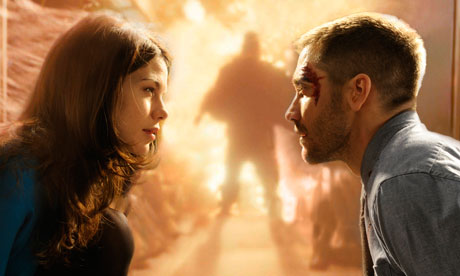 A minute to live.
A minute to live.Director Duncan Jones has already explored the genuine value of humanity by way of a relatively simplistic and observant film in the form of "Moon". He dared to redefine what really makes one human in the said film without even being, well, immediately human in nature. He has highlighted such in the fashion of say, "Blade Runner", and laid down a visual texture akin to "2001: A Space Odyssey". It's the struggle of a complex idea and visual stagnation (with it being set at the far reaches of the moon) that Duncan Jones has finely combined and from these was able to forge a brilliant science fiction film.
With his encounter with sci-fi minimalism a flat-out success, Here's "Source Code" coming within the midst of our viewing sensibilities. Molded more out of the same blockbuster tone like that of Nolan's "Inception" and a scenario close enough to Tony Scott's lukewarm "Unstoppable", the film, with its tight focus on the emotional content but still not deprived of some good ol' popcorn fun, is quite a well-balanced sci-fi affair with enough heart and soul on one side, energy and adrenaline on the other to fully present a complete film experience.
Jake Gyllenhaal, who's genuinely proven to be a capable actor to portray vulnerability in otherwise gun-equipped and battle-hardened roles ("Jarhead", "Brothers"), is very effective as the film's very Philip K. Dick-like protagonist Colter Stevens, a reluctant man clueless of what and where he's got himself into, emotionally needy yet articulate of his humanity.
Characterization-wise, that's just about it, I believe, in terms of complexity. With director Duncan Jones quite uninitiated with handling many characters at once (he only had the characters of Sam Bell and the robot Gerty to play with in "Moon"), this little hole in his skill has slightly showed itself in "Source Code".
Although the supporting roles, specifically the Goodwin and the Rutledge characters, were well-portrayed by the very dependable Vera Farmiga and the ever-impressive Jeffrey Wright respectively, the said characters were stereotypical at best. But with the material's imaginative edge, by Ben Ripley, reigning over the entirety of "Source Code", this slight flaw of deficient characterization is not really that noticeable as the film itself is just too overwhelming in its execution that you just wouldn't bother to look anywhere else.
To be frank, I expected this film to be very action-packed like, maybe "Deja Vu" (another Tony Scott film) in its race-against-time tone. I wouldn't really bother about an action set piece or two, but I'm impressed as to how "Source Code" has maintained its pulsating nature without resorting into unjustified action sequences.
Right now, as I ponder the reason as to why I liked this film very much, I realized that my admiration towards "Source Code" roots out more from its unorthodox view of humanity and the beauty of life rather than its intelligently magnified playfulness with space-time continuum and the mind. "Make every second count", the film's tagline preaches. Well, "Source Code", in its overall cinematic execution, verily did just that.
With his encounter with sci-fi minimalism a flat-out success, Here's "Source Code" coming within the midst of our viewing sensibilities. Molded more out of the same blockbuster tone like that of Nolan's "Inception" and a scenario close enough to Tony Scott's lukewarm "Unstoppable", the film, with its tight focus on the emotional content but still not deprived of some good ol' popcorn fun, is quite a well-balanced sci-fi affair with enough heart and soul on one side, energy and adrenaline on the other to fully present a complete film experience.
Jake Gyllenhaal, who's genuinely proven to be a capable actor to portray vulnerability in otherwise gun-equipped and battle-hardened roles ("Jarhead", "Brothers"), is very effective as the film's very Philip K. Dick-like protagonist Colter Stevens, a reluctant man clueless of what and where he's got himself into, emotionally needy yet articulate of his humanity.
Characterization-wise, that's just about it, I believe, in terms of complexity. With director Duncan Jones quite uninitiated with handling many characters at once (he only had the characters of Sam Bell and the robot Gerty to play with in "Moon"), this little hole in his skill has slightly showed itself in "Source Code".
Although the supporting roles, specifically the Goodwin and the Rutledge characters, were well-portrayed by the very dependable Vera Farmiga and the ever-impressive Jeffrey Wright respectively, the said characters were stereotypical at best. But with the material's imaginative edge, by Ben Ripley, reigning over the entirety of "Source Code", this slight flaw of deficient characterization is not really that noticeable as the film itself is just too overwhelming in its execution that you just wouldn't bother to look anywhere else.
To be frank, I expected this film to be very action-packed like, maybe "Deja Vu" (another Tony Scott film) in its race-against-time tone. I wouldn't really bother about an action set piece or two, but I'm impressed as to how "Source Code" has maintained its pulsating nature without resorting into unjustified action sequences.
Right now, as I ponder the reason as to why I liked this film very much, I realized that my admiration towards "Source Code" roots out more from its unorthodox view of humanity and the beauty of life rather than its intelligently magnified playfulness with space-time continuum and the mind. "Make every second count", the film's tagline preaches. Well, "Source Code", in its overall cinematic execution, verily did just that.



No comments:
Post a Comment